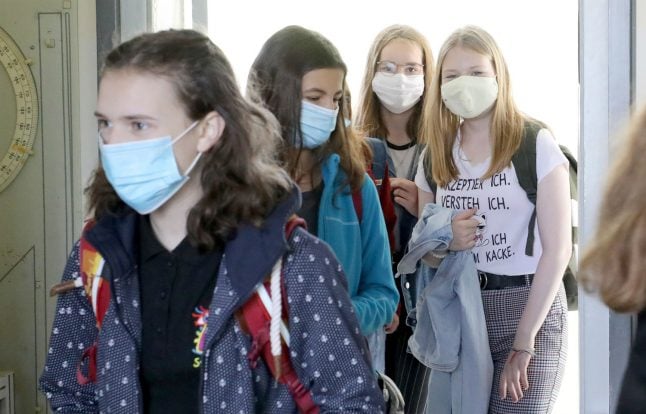The rest of the country was watching anxiously as 150,000 children returned to school in Mecklenburg-Western Pomerania, Germany's first state to restart full-time classes after the summer holidays, with infection numbers on the rise again.
Education ministers of Germany's 16 states had agreed for schools to reopen full-time after the summer break, after offering only partial hours in the weeks when the lockdown was eased.
With children in Hamburg to also return to school later this week and Berlin to follow next week, a debate is now growing over whether full-time school is realistic as infection numbers rise above 500 per day again.
READ ALSO: First schools in Germany to reopen to pupils – with new measures
Masks in corridors
Masks must be worn in the corridors, classrooms regularly ventilated and pupils are urged to wash their hands regularly and respect social distancing.
Not all went entirely to plan on Monday morning, however, as students excited to see their friends again after so long couldn't resist a few hugs in the playground.
“We hope everything will go well. We just don't know where they've been on holiday,” Steffen Kästner, headteacher of the CJD Jugendorf-Christophorus confessed.
CJD has 1,350 students aged 9-18. Only two are missing, a decision by their parents, “who belong to a risk group,” said the headteacher, but all the teachers are present.
At the CJD school, different age groups are being taught separately, so that if a pupil tests positive, only one class will have to go into quarantine and the rest of the school can remain open.
Mecklenburg-Western Pomerania has so far been relatively unaffected by the coronavirus, with only 20 deaths out of a total 9,200 in Germany since the beginning of the crisis.
Authorities have therefore decided to stick to basic hygiene measures agreed in mid-July by Germany's 16 states.
These include maintaining a minimum distance of 1.5 metres (five feet) between pupils outside classrooms, excluding pupils with symptoms and free testing for teachers.
 Children in Rostock on Monday. Photo: DPA
Children in Rostock on Monday. Photo: DPA
'Lost generation'
“Of course we are aware of the danger, but we have very few new infections in our region,” said Kay Czerwinski, a member of a local parents' association.
“The most important thing is to go back to school and avoid falling further behind, otherwise we risk having a lost generation,” he told AFP.
Masks have so far not been made compulsory in schools in the region, but the state's health minister Bettina Martin told the Norddeutscher Rundfunk radio on Monday that she wanted to “play it safe” and require masks outside of
classrooms.
Government spokeswoman Ulrike Demmer also came out in favour of masks on Monday, telling a press conference the measure “sounds like a reasonable consideration”.
'Enormous chaos'
Other regions have already decided on compulsory masks in schools. In Berlin, where school starts on August 10, pupils and teachers will have to wear them in all parts of the school apart from classrooms and playgrounds.
The same is true in Bavaria, where masks may even become compulsory in class, depending on the regional spread of the pandemic.
But even that is not enough, according to Heinz-Peter Meidinger, head of the DPhV teachers' union, who fears “enormous chaos” because of a “lack of preparation” in schools.
“In many schools, ventilation concepts and the isolation of learning groups cannot be implemented,” said Meidinger, who instead favours alternating face-to-face and distance learning classes.
READ ALSO: Coronavirus: Can Germany's schools safely reopen?
Some classes also cannot be taught because the teachers belong to a risk group. The DPhV has identified some 400 such classes in Mecklenburg-Western Pomerania alone.
Faced with all these difficulties, it would be “illusory” to think that schools “will return to normal functioning”, warned Saskia Esken, co-leader of the Social Democrats, the minority coalition partner in Angela Merkel's government.
By David Courbet



 Please whitelist us to continue reading.
Please whitelist us to continue reading.
Member comments